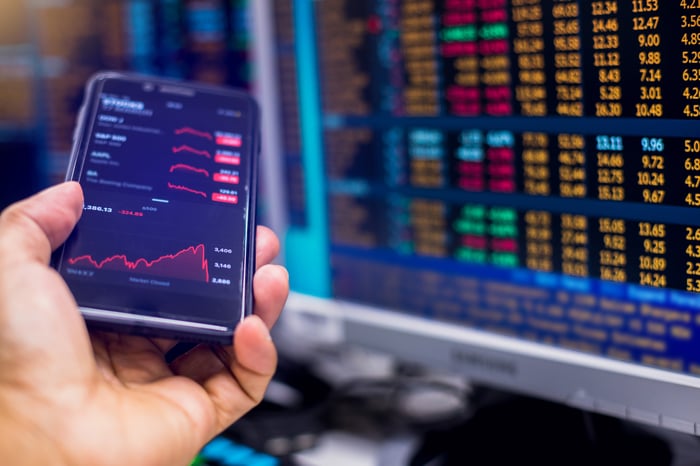For more than a century, the stock market has stood atop the pedestal among other investment vehicles. Though there have been years where bonds, oil, and even gold have outperformed the benchmark S&P 500, no investment vehicle even comes close to the average annual return of the stock market over the very long term.
However, the past decade has given rise to high-flying cryptocurrencies, like Bitcoin. With the world's largest digital currency catapulting from $1 to north of $40,000 per token, it and its peers are threatening to knock the S&P 500 off of its pedestal.
Interestingly, though, it's not Bitcoin that has investors captivated. This year has been all about the so-called "people's currency," Dogecoin (DOGE 13.80%).

Image source: Getty Images.
Make no mistake about it, the Dogecoin bubble will burst
Why Dogecoin? This simplest answer I can offer is retail investors love chasing assets with a lot of momentum. After beginning the year below half a penny ($0.005), Dogecoin has seen its tokens climb to as high as $0.73. Based on where things stood on June 15, Dogecoin is higher by more than 6,700% on a year-to-date basis, which is far better than any stock.
Dogecoin enthusiasts are also enamored with Tesla CEO Elon Musk taking a liking to their coin, as well as more merchants accepting Dogecoin as a form of payment.
But if you do any sort of digging into the bull case presented on social media, you'll discover that it's rife with hype and misinformation.
For instance, even though adoption of Dogecoin as a form of payment is technically moving higher, it's taken eight years just to get 1,400 mostly obscure businesses onboard. Keep in mind that this 1,400 figure is worldwide, and there are an estimated 582 million entrepreneurs globally. The point is that Dogecoin is (pardon the pun) virtually useless outside of a crypto exchange.
It's not exactly raising eyebrows within the payments space, either. Dogecoin's blockchain is handling in the neighborhood of 50,000 transactions daily. To put this into perspective, it would take almost four decades for Dogecoin's blockchain to process the number of transactions Visa and Mastercard handle in a single day, on a combined basis. Plus, Dogecoin's transaction fees are markedly higher than many popular competitors.
Furthermore, don't overlook that every bubble in history has eventually popped, without exception. There's no question that Dogecoin's 6,700%+ gain in a matter of months on the heels of social media hype represents a bubble.
These stocks are surefire winners
Rather than tossing your hard-earned money into the proverbial wishing well and hoping things turn out OK, I'd suggest ditching Dogecoin and putting your money to work in the following trio of surefire stocks. These are companies that have an exceptional track record of making patient investors money.

Image source: Getty Images.
Costco Wholesale
If you're seeking surefire long-term returns, look no further than warehouse club Costco Wholesale (COST 0.74%). Including dividends paid, Costco hasn't delivered a negative return to investors since 2008. What's more, its total return has been at least 20% in six of the past 12 years.
Costco's success is a function of two factors. To begin with, Costco's size and deep pockets help it to do what few other grocers and retailers can do. Specifically, Costco is able to purchase goods in bulk, which lowers the average price it pays per unit. This is one of the reasons most groceries at Costco are cheaper than what you'll find in chain-based supermarkets and corner stores. By appealing to consumers' desire to save a buck, it's able to draw quite the crowd.
The second factor, which adds onto the first, is that Costco is built on the membership model. The fees the company collects from selling its annual memberships allows it to really thin-out margins on grocery items in order to undercut its competition on price. This brings more people into its stores and increases the likelihood that higher-margin discretionary items will be purchased.
To add to this point, the membership model also encourages shoppers to spend more. Even though non-members aren't going to be shopping in Costco's warehouses, simply paying an annual fee for the right to shop at its stores is going to make consumers think twice about buying goods elsewhere.
Image source: Getty Images.
Broadcom
Believe it or not, Costco isn't the only well-known company working on a 12-year winning streak. Chipmaker Broadcom (AVGO 0.25%) is also riding a winning streak since 2008, which includes a total return of at least 12% for shareholders in eight of the past 10 years.
The big catalyst for Broadcom over the next five years looks to be the upgrade of wireless infrastructure in the U.S. to 5G capability. It's been a decade since wireless download speeds were significantly improved, which is expected to lead to a steady tech upgrade cycle for consumers and businesses that could last years. Broadcom generates the bulk of its revenue from wireless chips found in smartphones, as well as other smartphone accessories.
Additionally, Broadcom finds itself in the right place at the right time when it comes to data consumption. Between the coronavirus pandemic disrupting workplaces and the introduction of 5G, the demand for cloud storage is booming. Broadcom provides connectivity and access chips used in data centers, which are at the heart of this storage boom.
If you need one more reason to buy into Broadcom, consider its incredible dividend growth. In a decade, Broadcom's quarterly payout has grown by more than 5,000% to $3.60. It's not often a surefire tech stock is also going to put 3% annually in your pocket.

Image source: Getty Images.
Palo Alto Networks
A third surefire stock you'll be glad to own instead of Dogecoin is cybersecurity specialist Palo Alto Networks (PANW 1.39%).
On a broad scale, cybersecurity is one of the safest high-growth trends investors can put their money to work in this decade. No matter how well or poorly the economy is performing, robots and hackers don't take a day off. This means the onus of protecting enterprise and consumer data is falling into the laps of third-party cloud-based cybersecurity solutions providers.
Palo Alto is years into what's been a successful transformation. The company has effectively minimized its reliance on physical security solutions in favor of high-margin, cloud-based subscription services. These services, which rely on artificial intelligence to grow smarter at identifying and responding to threats, are often considerably cheaper and more effective to operate than on-premises security solutions.
The other cog to Palo Alto's overwhelming success is its willingness to make bolt-on acquisitions. These buyouts help expand the company's product portfolio and have made it far more appealing to small-and-medium-sized businesses.
With most cybersecurity stocks valued at nosebleed multiples relative to their sales, Palo Alto appears modestly priced at seven times Wall Street's forward-year consensus sales estimate.





